|
|
|
Sort Order |
|
|
|
Items / Page
|
|
|
|
|
|
|
| Srl | Item |
| 1 |
ID:
165882
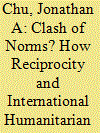

|
|
|
|
|
| Summary/Abstract |
Reciprocity is one of the oldest principles of warfare, but humanitarian norms embedded in international humanitarian law (IHL) prohibit reciprocity over various wartime acts. When it comes to the treatment of prisoners of war (POWs), how do these conflicting norms shape public opinion? One perspective is that citizens who learn about IHL acquire an unconditional aversion to abusing POWs. Alternatively, people may understand IHL as a conditional commitment that instead strengthens their approval for reciprocal conduct. Survey experiments fielded in the United States support the latter view: people’s preferences depend on the enemy’s behavior, and this “reciprocity effect” is largest among those who believe that the United States is legally committed to treating POWs humanely. Puzzlingly, prior studies do not find a reciprocity effect, but this is due to their use of a no-information experimental control group, which led to a lack of control over the subjects’ assumptions about the survey
|
|
|
|
|
|
|
|
|
|
|
|
|
|
|
|
| 2 |
ID:
165888
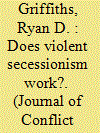

|
|
|
|
|
| Summary/Abstract |
Recent research suggests that the strategic use of violence may increase a group’s chance of gaining independence. We investigate this topic using comprehensive data on all secessionist movements between 1900 and 2006 and an original data set on the institutional and extrainstitutional methods that secessionists have used from 1946 to 2011. Our analysis yields several important findings. First, strategy depends on context. Not all secessionist movements are the same, and many have legal and/or institutional routes to independence that shape the methods that they employ. Second, no secessionist movement challenging a contiguous state has won its sovereignty without using institutional methods, either exclusively or in combination with extrainstitutional methods. Finally, we identify four successful combinations of secessionist methods and discuss how these movements develop in relation to their strategic setting. Overall, we find no evidence that violence helps a secessionist movement to gain independence.
|
|
|
|
|
|
|
|
|
|
|
|
|
|
|
|
| 3 |
ID:
165884


|
|
|
|
|
| Summary/Abstract |
The popular notion of a trade-off between social and defense spending—or guns versus butter—appears often in elite discourse, popular media, and empirical studies of budgetary politics. Yet, there are good reasons to suspect that the public’s preferences for these types of spending do not reflect that trade-off. I develop a theory that whether social and defense spending preferences are competing or complementary depends on if the respondent views the government as an important contributor to job creation. Using data from fifty-nine surveys in twenty-seven countries from 1985 to 2008, I show that favoring government-financed job creation makes a respondent much more likely to view social and defense spending as complementary. Indeed, aside from the anomalous case of the United States, preferences are consistent with guns yield butter instead of guns versus butter. This theory has important implications for the thermostatic model of policy responsiveness and theories of budgetary politics.
|
|
|
|
|
|
|
|
|
|
|
|
|
|
|
|
| 4 |
ID:
165889
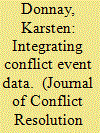

|
|
|
|
|
| Summary/Abstract |
The growing multitude of sophisticated event-level data collection enables novel analyses of conflict. Even when multiple event data sets are available, researchers tend to rely on only one. We instead advocate integrating information from multiple event data sets. The advantages include facilitating analysis of relationships between different types of conflict, providing more comprehensive empirical measurement, and evaluating the relative coverage and quality of data sets. Existing integration efforts have been performed manually, with significant limitations. Therefore, we introduce Matching Event Data by Location, Time and Type (MELTT)—an automated, transparent, reproducible methodology for integrating event data sets. For the cases of Nigeria 2011, South Sudan 2015, and Libya 2014, we show that using MELTT to integrate data from four leading conflict event data sets (Uppsala Conflict Data Project–Georeferenced Event Data, Armed Conflict Location and Event Data, Social Conflict Analysis Database, and Global Terrorism Database) provides a more complete picture of conflict. We also apply multiple systems estimation to show that each of these data sets has substantial missingness in coverage.
|
|
|
|
|
|
|
|
|
|
|
|
|
|
|
|
| 5 |
ID:
165887
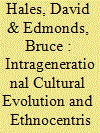

|
|
|
|
|
| Summary/Abstract |
Ethnocentrism denotes a positive orientation toward those sharing the same ethnicity and a negative one toward others. Previous models demonstrated how ethnocentrism might evolve intergenerationally (vertically) when ethnicity and behavior are inherited. We model short-term intragenerational (horizontal) cultural adaptation where agents have a fixed ethnicity but have the ability to form and join fluid cultural groups and to change how they define their in-group based on both ethnic and cultural markers. We find that fluid cultural markers become the dominant way that agents identify their in-group supporting positive interaction between ethnicities. However, in some circumstances, discrimination evolves in terms of a combination of cultural and ethnic markers producing bouts of ethnocentrism. This suggests the hypothesis that in human societies, even in the absence of direct selection on ethnic marker–based discrimination, selection on the use of fluid cultural markers can lead to marked changes in ethnocentrism within a generation.
|
|
|
|
|
|
|
|
|
|
|
|
|
|
|
|
| 6 |
ID:
165885


|
|
|
|
|
| Summary/Abstract |
How do new leaders impact crisis negotiations? We argue that opposing states know less about such a leader’s resolve over the issues at stake. To fully appreciate the consequences, we develop a multi-period bargaining model of negotiations. In equilibrium, as a proposer becomes close to certain of its opponent’s type, the duration and intensity of war goes to 0. We then test whether increase in leader tenure decrease the duration of militarized interstate disputes. Our estimates indicate that crises involving new leaders are 25.3 percent more likely to last one month than crises involving leaders with four years of tenure. Moreover, such conflicts are more likely to result in higher fatality levels. These results further indicate that leader tenure is a useful proxy for uncertainty.
|
|
|
|
|
|
|
|
|
|
|
|
|
|
|
|
| 7 |
ID:
165881


|
|
|
|
|
| Summary/Abstract |
Military academies tend to be strongly linked to the professionalization of the armed forces. This explains why many countries in the world have created such institutions. The following article studies a potential negative externality stemming from military schools: increased coup risk. We argue that military academies may create, inculcate, and strengthen cohesive views that could conflict with incumbent policies, and that these schools establish networks among military officers that may facilitate coordination necessary for plotting a putsch. We also contend and empirically demonstrate that these negative side effects of military academies are in particular pronounced in nondemocracies, that is, military academies have diverse effects across regime types. This work has significant implications for our understanding civil–military relations. Furthermore, we contribute to the literature on military education and professionalization, as we suggest that military academies are important vehicles through which coups can emerge predominantly in authoritarian states.
|
|
|
|
|
|
|
|
|
|
|
|
|
|
|
|
| 8 |
ID:
165883
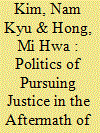

|
|
|
|
|
| Summary/Abstract |
Why do some states pursue transitional justice (TJ) in the immediate aftermath of armed conflict while others do not? What drives a state to select a particular type of justice mechanism over another? Building on the political explanations of TJ, we argue that postconflict justice (PCJ) decisions are driven by the interests and power of political elites shaped by recently ended conflicts. Our empirical analysis shows that conflict outcomes and their subsequent impact on the balance of power between the government and rebel groups are the most important determinants of PCJ decisions. Domestic trials are most likely to emerge out of a decisive, one-sided victory while truth commissions and reparations are most likely to occur after a negotiated settlement. We also find that conflict severity interacts with conflict outcomes to affect PCJ decisions.
|
|
|
|
|
|
|
|
|
|
|
|
|
|
|
|
| 9 |
ID:
165886


|
|
|
|
|
| Summary/Abstract |
A growing number of developed country governments link good governance, including human rights, to developing countries’ access to aid, trade, and investment. We consider whether governments enforce these conditions sincerely, in response to rights violations, or whether such conditions might instead be used as a veil for protectionist policies, motivated by domestic concerns about import competition. We do so via an examination of the world’s most important unilateral trade preference program, the US Generalized System of Preferences (GSP), which includes worker rights as one criterion for program access. We argue that the two-tiered structure of the GSP privileges some domestic interests at one level, while disadvantaging them at the other. Using a new data set on all US GSP beneficiary countries and sanctioning measures from 1986 to 2013, we demonstrate that labor rights outcomes play a role in the maintenance of country-level trade benefits and that import competition does not condition the application of rights-based criteria at this level. At the same, however, the US government does not consider worker rights in the elements (at the country-product level) of the program that have the greatest material impact. The result is a situation in which the US government talks somewhat sincerely at the country level in its rights-based conditionality, but its behavior at the country-product level cheapens this talk.
|
|
|
|
|
|
|
|
|
|
|
|
|
|
|
|
|
|
|
|
|